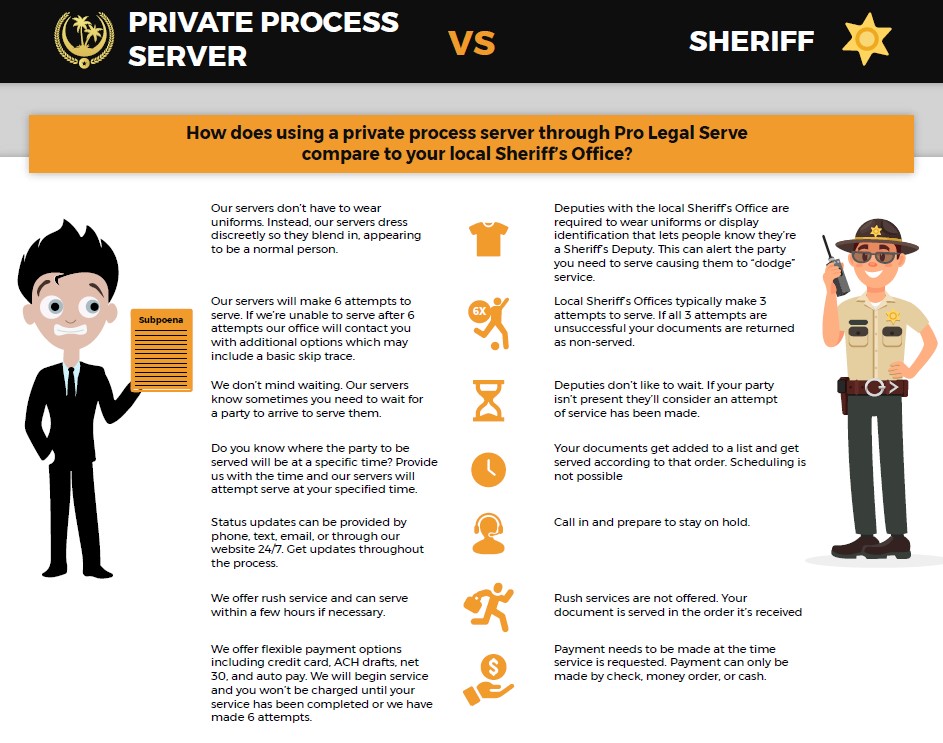Recognizing the Significance of Refine Serving in Lawful Procedures
Refine offering is an essential facet of legal procedures that ensures all events are informed of their obligations and legal rights. By facilitating the official distribution of important lawful documents, it supports the principles of due procedure and adds to the integrity of the judicial system. Nevertheless, the nuances of effective process serving prolong past simple distribution; they incorporate lawful requirements and prospective effects of improper service. Comprehending these details can significantly impact the results of legal conflicts, triggering a better assessment of the techniques that underpin this essential feature.
Definition of Refine Offering
Process offering is a critical part of the lawful system, defined as the formal shipment of lawful records to people associated with a litigation. This process ensures that all events are adequately educated of lawsuits being taken versus them or to which they are a celebration. Usually, these files consist of summons, complaints, subpoenas, and other court-related documents that need the recipient's attention and feedback.
The relevance of process offering depend on its duty in maintaining the principles of due procedure. It ensures that people have notice of lawful procedures, thereby supplying them an opportunity to react or defend themselves. Correct service of procedure is not merely a step-by-step formality; it is an essential aspect of making certain fairness and openness in the judicial system.
Refine serving can be performed by various people, consisting of professional process-server, police police officers, or perhaps lawyers, depending on administrative laws. Each method of service has its very own standards and techniques, which are crucial to stop delays or dismissals within the legal framework. Therefore, understanding the meaning and function of process serving is vital for all stakeholders entailed in lawful process.

Lawful Requirements for Process Offering
Lawful needs for procedure offering are essential to guarantee that the shipment of legal records follows developed methods and is identified by the court. Each territory has details regulations controling just how and when papers need to be offered, which may include subpoenas, complaints, and summonses.
Typically, process-server need to be unbiased 3rd parties that are not included in the case. They must additionally abide with state laws concerning solution techniques, which can consist of personal service, replacement solution, or service by mail. Individual service involves supplying papers directly to the recipient, while replacement service permits delivery to an additional accountable person at the recipient's home or workplace.
In addition, process web servers are typically required to submit a proof of solution, a legal paper that verifies the distribution of papers, with the court. This record includes information such as the date, time, and approach of service, along with the name of the person offered.

Duty in the Justice System
An essential component of the justice system, process serving guarantees that individuals associated with legal procedures are correctly informed of actions taken against them (Process Serving). This formal notification is vital for promoting the principles of due process, which mandates that parties have the opportunity to react to claims made against them. Without reliable procedure offering, the legal system would be rendered ineffective, as individuals can participate in activities without understanding of pending legal matters
Refine web servers serve an important role in safeguarding the integrity of the lawful procedure. They serve as neutral parties, delivering lawful papers such as summons, grievances, and subpoenas, thus cultivating openness and responsibility within the judicial framework. By guaranteeing that all parties are educated, process serving aids to stop any possible unjust advantage, enabling fair participation in lawful procedures.
Furthermore, the professionalism and trust of process-server adds to the public's trust fund in the justice system. Their adherence to legal standards and moral methods reinforces the authenticity of the judicial process. Eventually, effective procedure offering is vital in promoting the regulation of law and guaranteeing that justice is accessible to all individuals included in legal conflicts.
Repercussions of Improper Service
The repercussions of inappropriate service can considerably threaten the integrity of lawful process. When a party is not offered appropriately, it can lead to a host of issues, consisting of delays in case timeline and raised legal expenses. Inappropriate solution can result in the accused not recognizing the lawful action against them, which might stop them from reacting appropriately or providing their protection. This absence of notification can ultimately result in skip judgments, where the court policies in support of the complainant without hearing the defendant's side.
Additionally, incorrect service can make court orders and judgments invalid, requiring the plaintiff to reboot the process, which can be both lengthy and economically troublesome. It can also open up the door to challenges and appeals, as the accused may suggest that they were not appropriately alerted of the procedures, complicating the lawful landscape further.
Ideal Practices for Effective Solution

2nd, timing plays a crucial function. Serving records immediately can prevent delays in lawful process and make sure that all events are informed in a timely manner. Furthermore, employing a professional process-server can enhance performance, as they are trained to navigate prospective obstacles and guarantee conformity with regional regulations.
Third, maintaining accurate records of the service procedure is essential. Recording the date, time, and way of solution can supply vital evidence if disputes develop pertaining to whether solution was properly carried out.
Final Thought
In final thought, process serving is an important component of lawful procedures, making certain that all parties are duly alerted and afforded the possibility to react. Complying with lawful demands and best practices not only promotes the principles of due process yet additionally reinforces the stability of the justice system. go right here The consequences of improper solution can lead to considerable delays and problems, highlighting the requirement for effective procedure offering in promoting fairness and accessibility in legal disagreements.
The nuances of effective process serving extend past mere delivery; they include legal needs and prospective effects of incorrect solution.Refine serving is an essential element of the legal system, specified as the formal delivery of lawful files to individuals included in a court instance. Without effective procedure offering, the lawful system would be provided inadequate, Clicking Here as people might engage in activities without understanding of pending lawful matters.
Refine web servers serve a crucial duty in protecting the integrity of the lawful process - Process Serving. The effects of improper solution can lead to significant hold-ups and complications, highlighting the need for effective procedure offering in promoting justness and ease of access in lawful disputes